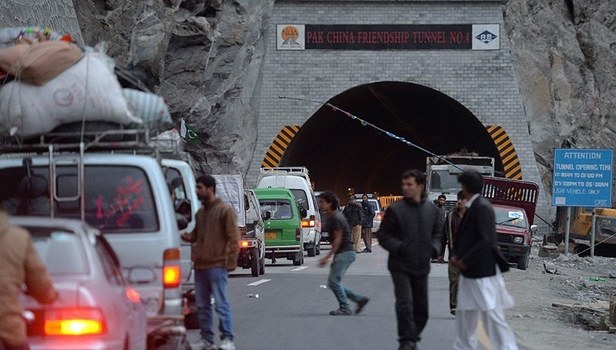Gilgit-Baltistan: Why did India show displeasure over the decision of the Pakistani Supreme Court?
04 May 2020 ( IBTN News Bureau )
India has lodged a strong objection to the decision of the Pakistani Supreme Court to allow elections in Gilgit-Baltistan.
Before independence from Britain, Gilgit-Baltistan was a part of the princely state of Jammu and Kashmir. But it has been controlled by Pakistan since 1947.
Pakistan considers Jammu and Kashmir a disputed area and has been demanding a referendum there, citing UN resolutions.
On the other hand, India says that Jammu and Kashmir is an integral part of India and its merger with India is legal. Therefore, Gilgit-Baltistan also belongs to him.
So when the Supreme Court of Pakistan approved to hold elections there on 30 April, India became angry. The Indian Foreign Ministry has strongly objected to this.
The Foreign Ministry says that instead of holding elections to Pakistan, Gilgit-Baltistan should be evacuated immediately. The ministry has said in its statement that Pakistan has no right to hold elections there.
India says that Pakistan has illegally kept these areas under its occupation.
What has Pakistan said on India's response?
Pakistan has rejected India's response to Gilgit-Baltistan. This information has been given in a statement issued by the Foreign Ministry of Pakistan.
According to the press release, Pakistan has called a senior Indian diplomat and said that India's response is baseless and misleading.
The Pakistani Foreign Ministry says that there is no legal basis for India's claim to consider Jammu and Kashmir as an integral part of it and that the entire Jammu and Kashmir is a disputed area and also believed by the international community.
Pakistan has reiterated its stand in the press release that the J&K dispute should be decided under the UN resolutions giving Kashmiri people the right to self-determination. It can be decided only by an independent and impartial referendum.
Pakistan has said that the tampering of Jammu and Kashmir's demography by India in August last year is a violation of the Geneva Treaty. India abolished Article 370 giving autonomy to Jammu and Kashmir in August last year.
Simultaneously Jammu and Kashmir and Ladakh were converted into Union Territories.
Pakistan says that by raising the issue of Gilgit-Baltistan, India cannot divert the attention of the international community from how its army oppresses the Kashmiri people.
Supreme Court of Pakistan decides
In its order on 30 April, the Supreme Court of Pakistan has said that elections should be held there and in the meantime an interim government should be formed there.
And this is a decision, which has been made for the first time regarding Gilgit-Baltistan. Normally in Pakistan, an interim government is formed before the new elections, which supervise the elections.
According to Zeeshan Haider, the BBC Urdu service's news editor in Pakistan, this was not yet done for the Gilgit-Baltistan region. This is the first time that there will be elections in September under the leadership of an interim government.
Gilgit-Baltistan has held elections many times before and many have become chief ministers. But this time the election will be under the supervision of the interim government.
A seven-member bench headed by Chief Justice of Pakistan Supreme Court Gulzar Ahmed has asked for the 2018 amending the Gilgit-Baltistan government order to hold elections.
In 2018, Pakistan had given many important powers to the Gilgit-Baltistan Assembly, although in that too the Prime Minister of Pakistan had an important role.
Earlier there was a committee to decide on Gilgit-Baltistan, headed by the PM of Pakistan. But this 2009 order was amended in 2018.
The tenure of the current government of Gilgit-Baltistan ends in June. General elections should be held there within 30 days.
What is the situation in Gilgit-Baltistan?
Gilgit-Baltistan was controlled by the Dogra dynasty. When Hindu Maharaja Hari Singh of Kashmir agreed to the merger of Jammu and Kashmir with India, majority of the Muslims here revolted.
The Dogra governor of Gilgit-Baltistan was banished by the Muslims and then captured by the Pakistani soldiers.
Since 1947, India and Pakistan have been making different claims about Jammu and Kashmir.
The region also borders China with Xinjiang Province and Afghanistan. For this reason Gilgit-Baltistan also has strategic importance.
China's famous economic corridor plan also passes through Gilgit-Baltistan. The Karakoram Highway connecting Pakistan to China is also in this area.
India has already registered its strong objection to the Pakistan-China Economic Corridor.
In 1970 Pakistan gave it the status of a separate administrative unit. In 2009, the then President of Pakistan Asif Ali Zardari gave it limited autonomy. Here the Chief Minister is there, but the real power remains in the hands of the Governor.
At one time there was a demand for the inclusion of Gilgit-Baltistan as the official province of Pakistan, but at that time Pakistan turned it down saying that it would affect its demand in the ongoing dispute over the entire Jammu and Kashmir case.
Pakistan considers the whole of Jammu and Kashmir a disputed area and talks about holding a referendum there under the UN resolutions. Although India has been rejecting it.
Spread over 73 thousand kilometers, Gilgit-Baltistan has a population of about 2 million.
(Click here for Android APP of IBTN. You can follow us on facebook and Twitter)
Share This News
About sharing
-
 16 Sep 2025
UN inquiry finds Israel’s war on Gaza to be genocide
16 Sep 2025
UN inquiry finds Israel’s war on Gaza to be genocide
UN inquiry finds Israel’s war on Gaza to be genocide
-
 16 May 2025
Has Donald Trump taken US-Gulf relations to a new era?
16 May 2025
Has Donald Trump taken US-Gulf relations to a new era?
Has Donald Trump taken US-Gulf relations to a new era?
May 16, 2...
-
 16 May 2025
What do the Gulf states gain from the US president's historic trip to the region?
16 May 2025
What do the Gulf states gain from the US president's historic trip to the region?
What do the Gulf states gain from the US president's historic trip to the regio...
-
 15 May 2025
Pakistan FM: US didn't force the ceasefire with India | Talk to Al Jazeera
15 May 2025
Pakistan FM: US didn't force the ceasefire with India | Talk to Al Jazeera
Pakistan FM: US didn't force the ceasefire with India | Talk to Al Jazeera
-
 15 May 2025
How will the lifting of US sanctions help Syrians rebuild their country?
15 May 2025
How will the lifting of US sanctions help Syrians rebuild their country?
How will the lifting of US sanctions help Syrians rebuild their country?



